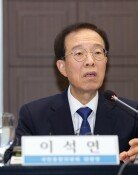Foreign minister talks about difference between ‘nuclear free zone’ and denuclearization
Foreign minister talks about difference between ‘nuclear free zone’ and denuclearization
Posted May. 26, 2021 07:27,
Updated May. 26, 2021 07:27
South Korean Foreign Minister Chung Eui-yong said on Tuesday that there is no significant difference between the term “nuclear free zone,” used by North Korea, and denuclearization on the Korean Peninsula, used both by South Korea and the United States. His remarks, however, have caused controversy since North Korea has been using the term to demand the withdrawal of U.S.’ extended deterrence commitments, including the nuclear umbrella provided to South Korea and the pullout of U.S. troops from South Korea.
When asked about the difference between the term nuclear free zone used by the North Korean side and denuclearization of the Korean Peninsula used by South Korea, Foreign Minister Chung said he does not think there is a big difference between the two during a briefing by the Ministry of Foreign Affairs, the Ministry of Trade, Industry, and Energy, and the Ministry of Health and Welfare on the outcome of the South Korea-U.S. summit. Minister Chung said that denuclearization of the Korean Peninsula is the term being used since the 1992 Joint Declaration on the Denuclearization of the Korean Peninsula and the meaning of denuclearization of the Korean Peninsula was clarified in the Panmunjom Declaration in April 2018 and Pyongyang Join Declaration in September 2018, adding that North Korea reaffirmed its commitment to complete denuclearization of the Korean Peninsula in the Joint Declaration with the U.S. at Singapore Summit in June 2018.
North Korea, however, is using the term nuclear free zone, arguing that all nuclear threats, including the U.S. nuclear umbrella over South Korea and U.S. troops stationed in South Korea, must be eliminated from the Korean Peninsula. North Korea has been demanding the establishment of a nuclear-free zone on the Korean Peninsula since it insisted in April 1959 that a nuclear-free peace zone should be created in Asia. In particular, in a statement released in the name of a government spokesperson immediately after the 7th Party Congress in May 2016, North Korea detailed five conditions for denuclearization on the Korean Peninsula. The conditions include disclosing U.S. nuclear weapons in South Korea, removing and verifying all nuclear bases in South Korea, guaranteeing that the U.S. will not deploy nuclear weapons (strategic bomber) on the Korean Peninsula, assuring that the U.S. will not threaten or conduct a nuclear strike on North Korea, and withdrawing U.S. troops in South Korea.
The scope of denuclearization claimed by North Korea is differed greatly from that of South Korea and the U.S., and that difference has acted as an obstacle to nuclear negotiations with the North.
Oh-Hyuk Kwon hyuk@donga.com




![[속보]美 “미국인은 이란 당장 떠나라” 대사관 긴급 공지](https://dimg.donga.com/c/138/175/90/1/wps/NEWS/IMAGE/2026/01/13/133147285.1.jpg)


